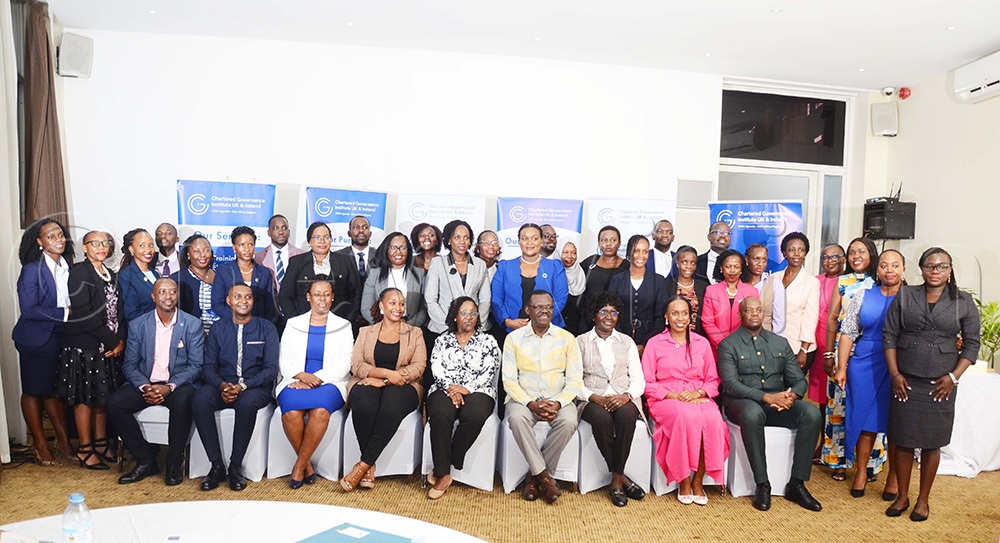NSSF's Ayota tips professionals on intergenerational wealth transfer
Ayota, who was a keynote speaker at the graduation and mentorship programme of the Institute of Chartered Secretaries and Administrators (ICSA) Uganda, shared insights on intergenerational wealth transfer.
Managing Director NSSF Patrick Ayota and Jane Okot p'Bitek Langoya, the Chairperson ICSA Uganda handing over certificate to a graduate Samuel Mugabi, legal officer Bank of Africa (Photo by Isaac Nuwagaba)
__________________
The managing director of the National Social Security Fund (NSSF), Patrick Ayota, has urged civil servants and professionals to adopt long-term planning and strategies to ensure wealth is securely transferred to future generations.
Ayota, who was a keynote speaker at the graduation and mentorship programme of the Institute of Chartered Secretaries and Administrators (ICSA) Uganda, shared insights on intergenerational wealth transfer at Protea Hotel Marriott Skyz in Naguru on Saturday, August 23.
Also serving as the Vision Group board chairman, Ayota stressed that intergenerational wealth transfer is a vital part of financial planning, enabling individuals to protect their family’s financial future and legacy.
“By transferring wealth to future generations, individuals can ensure that their hard-earned assets are protected and utilised effectively for the betterment of their families because wealth grows slowly by slowly,” he said.
He observed that many Ugandans prioritise buying land and constructing buildings, but such investments may not always serve their long-term needs.
“You can have 100 acres of land, but when you fall sick at night, you need cash. Many of you should invest in land in villages, but when you have children raised in Kampala, you need to turn your assets into liquid form and buy bonds for them to benefit on interest generated for investment,” he advised.
(Front Row) Managing Director NSSF Patrick Ayota (fourth right) and Jane Okot p'Bitek Langoya, the Chairperson ICSA Uganda (middle) in a group picture with ICSA graduates at Protea Skyz. (Photo by Isaac Nuwagaba)
Ayota further cautioned that poorly structured assets may tempt children and grandchildren, particularly those raised in urban settings, to sell them off and waste the proceeds.
Creating a clear estate plan that outlines how assets will be distributed after one’s passing, he added, is crucial. However, he emphasised that the greatest legacy is the brand name one builds while still alive.
“Your brand name should be able to continue helping your people and company survive, especially when you have established trusts to manage and distribute assets to beneficiaries,” he advised.
He also encouraged gifting assets to beneficiaries during one’s lifetime to reduce tax liabilities and ease the transfer process.
“Developing a plan for the succession of family businesses to ensure continuity and stability should be mandatory; otherwise, your children will sell your acquired property and even kill your wife to sell off your estate, which you must get worried about.”
Challenges and considerations
Ayota highlighted key challenges individuals must consider when planning intergenerational wealth transfer.
“Understanding the tax implications of wealth transfer and developing strategies to minimise tax liabilities. Ensuring that beneficiaries are prepared to manage and utilise the transferred wealth effectively is what you should emphasise because many forces fight heirs when you die,” he insisted.
Dream boldly, risk wisely
The chief executive officer of Abi Finance Limited, Mona Muguma Ssebuliba, also advised professionals to build wealth by saving consistently and committing to disciplined financial planning.
“You must design for yourself future plans for wealth generation over time, and this calls for key decisions to make. For every yes, there is a no for something regarding future investments and goals,” Muguma advised.
She urged professionals to combine ambition with caution.
“Let us dream boldly but risk wisely when conducting both long-term and short-term gain businesses.
“You should have the maturity to recognise that at every stage, negative people will have to leave your life and new ones enter, but this takes courage to remain adamant on your future plans,” Muguma advised.
Intergenerational wealth transfer, she added, provides benefits such as securing family legacy, reducing tax liabilities, promoting financial literacy, and fostering family unity.
31 company administrators graduate with certificates
According to the chairperson of ICSA Uganda, Jane Okot p’Bitek Langoya, 31 secretaries and administrators graduated with certificates after completing a ten-week mentorship programme from June 14 to August 23, 2025, as part of a refresher training course.
“ICSA offers professional qualifications covering business, company law, corporate governance, management, finance, accounting, administration, and company secretarial practice,” she said.
Samuel Mugabi, senior legal officer at Bank of Africa, noted that the mentorship programme prepared participants for the governance marketplace.
“The topics are designed to create lasting impact on all the mentees, and I have personally started practising all the curriculum learnt during the training,” he said.